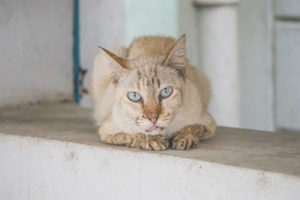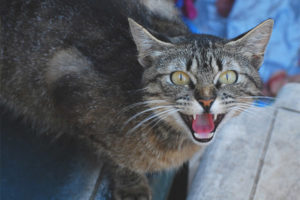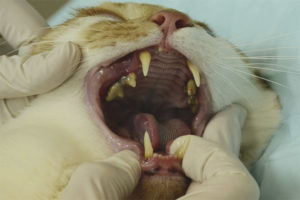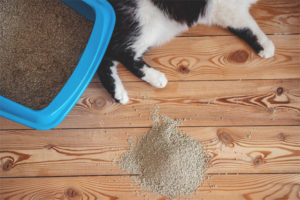The content of the article
Cats have sharp teeth, if the animal is angry, the cat can seriously bite. The wounds after such bites are not very large, but quite deep. As a rule, in the oral cavity of animals contains a huge number of bacteria and microbes, which can become a source of infection. In this article, we’ll talk about cat bites - how and why a pet bites, why such injuries are dangerous and what to do if a cat bit you.
What is dangerous cat bites
Despite the fact that a cat eventually becomes a pet, it is still an animal that obeys instincts. A cat can bite a stranger as a defense. Cats very often bite with jealousy if the owner brought another animal into the house. A cat can bite if it hurts. Such an unpleasant surprise can be presented by a domestic cat, so what can we say about street animals that are not used to humans at all? Street cats are also dangerous in that they are not vaccinated against various fatal infections. What is dangerous cat bites, try to figure it out.
- Pastorellosis. This is a disease that is transmitted to humans from animal bites. Today this disease is not widespread, but it still occurs. Animal carriers of pastorellosis have a huge amount of pathogenic bacteria in the oral cavity that enter the wound, and infection begins. The disease is manifested by intoxication, the wound becomes painful, inflamed, swollen, the patient may begin to have diarrhea, and sometimes the respiratory system is affected. It is important to understand that bacteria can even enter through the tongue of the animal if the cat licks an open wound.
- Streptococcus and staphylococcus. These are common infections that can lead to painful swelling in the bite, fever, skin infection, and even blood poisoning. With such infections, suppuration immediately begins at the site of the bite.
- Sporotrichosis. This is a fungal disease that leads to non-healing wounds on the animal’s body. The incubation period of the disease is very large - up to several weeks. The first symptom of sporotrichosis is an open wound from a bite that does not last for a long time.
- Cat scratch fever. The disease often develops not after a bite, but after scratching, especially if it was not an adult cat that scratched, but a kitten. Bacterial infection in this case is not very serious, the body can easily cope on its own without the use of medications. If the immunity is weakened, the infection becomes serious, along with the affected skin, you can notice that the patient has lymph nodes enlarged.
- Rabies. Dogs often get sick from rabies, but cats still suffer from the disease, too. Especially street ones - they are without vaccinations. Rabies develops from a few days to 10-12 weeks after a bite. With rabies, symptoms such as headache, fever, aching joints, sore throat, skin lesions in the bite area, and aggressiveness appear. The condition is very dangerous, necessarily requires medical intervention.
- Tetanus. Tetanus infections from animal bites are rare, but they do happen. Tetanus is an acute and dangerous infectious disease that affects the nervous system. The first symptoms of tetanus are headache, sweating, twitching and muscle tension in the area of the affected wound. To avoid serious and even fatal consequences, you need to immediately take a tetanus vaccine immediately after a bite.
These are the main, serious and really dangerous diseases that can be caused by a harmless cat bite.In addition to them, simple bacteria can get into the wound, which, nevertheless, will bring you a lot of discomfort. To avoid this, you need to provide first aid correctly.
What to do if a cat has bitten
A cat bite is dangerous because the infection that is in the animal’s oral cavity immediately falls into a serious depth of the wound, it is much harder to get bacteria out of it. Here are some recommendations that will not save you 100% from infection, but will reduce the likelihood of infection.
- Immediately after the bite, you need to wash the wound under running water, carefully soaping it with laundry soap. The composition of natural soap contains a lot of salicylic acid, which suppresses some bacteria and harmful microorganisms.
- If blood flows from a wound, do not stop it. All microbes come out with blood.
- After that, you must surely disinfect the bite with what you have in the medicine cabinet. It can be iodine, hydrogen peroxide, chlorophyllipt, alcohol, zelenka, furatsilina solution, miramistin, etc. After some time, you can treat the wound with antibacterial solutions or ointment, for example, chloramphenicol or tetracycline.
- After treatment, apply a patch or bandage to the wound that will protect against additional infection.
Experts note that a cat bite wound inflames much more often than other injuries. Not only can the cat itself be a carrier of a bacterial infection, it often gets infected from street food if it eats food waste, poultry, rats, etc.
When to see a doctor
The first few hours after the bite, you should carefully monitor the wound and condition of the patient. It is clear that after a bite the wound will hurt, but with severe pain, intense redness, swelling, you should definitely see a doctor. Especially if it is accompanied by an increase in temperature. You should definitely seek medical help even with a minor bite, if it was a street cat. If you notice a foam in the mouth of a cat, if drool is actively flowing - this is rabies, go to the hospital immediately.
If rabies is suspected, a person is prescribed a course of vaccination against rabies immunization. It is impossible to protect against rabies in one injection, you need to do several injections at regular intervals. The amount and frequency of the vaccine is regulated by the doctor. By the way, the animal is also subjected to research, if it is not street and has not run away.
In other cases, when an animal vaccinated against rabies has bitten, antibiotics are given to the patient, orally, injection or drip, depending on the severity of the infection. In addition, local treatments are required. As a rule, treatment lasts 5-7 days, in difficult cases 10-14 days. You can not cancel antibiotics, if you feel better, bacteria should be completely suppressed. Otherwise, they not only restore the population, but also develop resistance - that is, they become resistant and insensitive to drugs of this group.
At risk are people with reduced immunity - children, elderly, pregnant women, patients with after organ transplantation or chemotherapy, diabetics, people with HIV and various blood pathologies. Such patients should immediately consult a doctor even with minor cat bites. Indeed, infection is very dangerous - a person may develop renal failure, sepsis. It is especially dangerous if the cat has bitten its hands - tendons and bones are in close proximity to the skin, this is fraught with inflammation of the periosteum.
How to Avoid Cat Bites
Cats are not only affection, tenderness and a pleasant purr. These are bites, vaccinations, additional worries. Despite this, we love our pussies and become attached to animals with all our souls.
Video: first aid and treatment for a cat bite










Submit